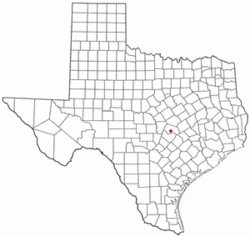Brushy Creek, Williamson County, Texas
Brushy Creek, Texas | |
|---|---|
 Location of Brushy Creek, Texas | |
 | |
| Coordinates: 30°30′39″N 97°44′5″W / 30.51083°N 97.73472°W | |
| Country | United States |
| State | Texas |
| County | Williamson |
| Area | |
• Total | 7.0 sq mi (18 km2) |
| • Land | 6.93 sq mi (17.9 km2) |
| • Water | 0.07 sq mi (0.2 km2) |
| Elevation | 827 ft (252 m) |
| Population (2020) | |
• Total | 22,519 |
| • Density | 3,200/sq mi (1,200/km2) |
| Time zone | UTC-6 (Central (CST)) |
| • Summer (DST) | UTC-5 (CDT) |
| ZIP code | 78717 |
| Area code | 512 |
| FIPS code | 48-10897[1] |
| GNIS feature ID | 1867542[2] |
Brushy Creek is a census-designated place (CDP) in Williamson County, Texas, United States. The population was 22,519 at the 2020 census.[3]
Geography
[edit]Brushy Creek is located at 30°30′39″N 97°44′05″W / 30.510970°N 97.734697°W (30.510970, -97.734697),[4] just west of Round Rock along the shore of Brushy Creek.
According to the United States Census Bureau in 2000, the CDP has a total area of 8.7 square miles (22.6 km2), all land. Prior to the 2010 census, the CDP had parts annexed to the cities of Austin and Round Rock and lost additional area, reducing its total area of 7.0 square miles (18 km2), of which 6.93 square miles (17.9 km2) were then land and 0.07 square miles (0.18 km2) was water.[5][6]
Demographics
[edit]| Census | Pop. | Note | %± |
|---|---|---|---|
| 1990 | 5,833 | — | |
| 2000 | 15,371 | 163.5% | |
| 2010 | 21,764 | 41.6% | |
| 2020 | 22,519 | 3.5% | |
| U.S. Decennial Census[7] 1850–1900[8] 1910[9] 1920[10] 1930[11] 1940[12] 1950[13] 1960[14] 1970[15] 1980[16] 1990[17] 2000[18] 2010[19] | |||
2020 census
[edit]| Race | Number | Percentage |
|---|---|---|
| White (NH) | 13,312 | 59.11% |
| Black or African American (NH) | 1,109 | 4.92% |
| Native American or Alaska Native (NH) | 52 | 0.23% |
| Asian (NH) | 3,032 | 13.46% |
| Pacific Islander (NH) | 17 | 0.08% |
| Some Other Race (NH) | 106 | 0.47% |
| Mixed/Multi-Racial (NH) | 1,230 | 5.46% |
| Hispanic or Latino | 3,661 | 16.26% |
| Total | 22,519 |
As of the 2020 United States census, there were 22,519 people, 5,713 households, and 4,432 families residing in the CDP.
As of the census[1] of 2000, there were 15,371 people, 4,805 households, and 4,252 families residing in the CDP. The population density was 1,764.8 inhabitants per square mile (681.4/km2). There were 4,919 housing units at an average density of 564.8 per square mile (218.1/km2). The racial makeup of the CDP was 82.95% White, 4.08% African American, 0.27% Native American, 6.81% Asian, 0.08% Pacific Islander, 3.71% from other races, and 2.09% from two or more races. Hispanic or Latino of any race were 10.23% of the population.
There were 4,805 households, out of which 57.9% had children under the age of 18 living with them, 80.2% were married couples living together, 6.8% had a female householder with no husband present, and 11.5% were non-families. 8.6% of all households were made up of individuals, and 1.4% had someone living alone who was 65 years of age or older. The average household size was 3.18 and the average family size was 3.39.
In the CDP, the population was spread out, with 35.0% under the age of 18, 4.7% from 18 to 24, 39.1% from 25 to 44, 17.2% from 45 to 64, and 4.0% who were 65 years of age or older. The median age was 32 years. For every 100 females, there were 96.3 males. For every 100 females age 18 and over, there were 93.7 males.
The median income for a household in the CDP was $84,472, and the median income for a family was $85,370 (these figures had risen to $107,465 and $113,523 respectively as of a 2007 estimate[22]). Males had a median income of $60,409 versus $39,542 for females. The per capita income for the CDP was $28,129. About 1.2% of families and 1.7% of the population were below the poverty line, including 2.0% of those under age 18 and 1.3% of those age 65 or over.
Education
[edit]Much of the CDP is in the Round Rock Independent School District while some portions are in the Leander Independent School District.[23]
Elementary schools serving RRISD sections of Brushy Creek include Brushy Creek,[24] Fern Bluff,[25] Great Oaks,[26] Old Town,[27] and Sommer.[28] Middle schools serving RRISD sections include Cedar Valley, Chisholm Trail, Pearson Ranch, and James Garland Walsh.[29] Some RRISD portions are zoned to Round Rock High School and others are zoned to McNeil High School.[30][31]
Leander ISD sections are zoned to Akin Elementary School,[32] Stiles Middle School,[33] and Vista Ridge High School.[34]
Nearby localities
[edit]The following diagram represents localities within a 12 kilometres (7.5 mi) radius of Brushy Creek.

References
[edit]- ^ a b "U.S. Census website". United States Census Bureau. Retrieved January 31, 2008.
- ^ "US Board on Geographic Names". United States Geological Survey. October 25, 2007. Retrieved January 31, 2008.
- ^ "Explore Census Data". data.census.gov. Retrieved October 7, 2023.
- ^ "US Gazetteer files: 2010, 2000, and 1990". United States Census Bureau. February 12, 2011. Retrieved April 23, 2011.
- ^ "Population and Housing Unit Counts, 2010 Census of Population and Housing" (PDF). Texas: 2010. Retrieved January 6, 2017.
- ^ "Boundary Map of Brushy Creek, Texas". MapTechnica. Archived from the original on January 6, 2017. Retrieved January 6, 2017.
- ^ "Decennial Census by Decade". United States Census Bureau.
- ^ "1900 Census of Population - Population of Texas By Counties And Minor Civil Divisions" (PDF). United States Census Bureau.
- ^ "1910 Census of Population - Supplement for Texas" (PDF). United States Census Bureau.
- ^ "1920 Census of Population - Number of Inhabitants - Texas" (PDF). United States Census Bureau.
- ^ "1930 Census of Population - Number of Inhabitants - Texas" (PDF). United States Census Bureau.
- ^ "1940 Census of Population - Number of Inhabitants - Texas" (PDF). United States Census Bureau.
- ^ "1950 Census of Population - Number of Inhabitants - Texas" (PDF). United States Census Bureau.
- ^ "1960 Census of Population - Number of Inhabitants - Texas" (PDF). United States Census Bureau.
- ^ "1970 Census of Population - Number of Inhabitants - Texas" (PDF). United States Census Bureau.
- ^ "1980 Census of Population - Number of Inhabitants - Texas" (PDF). United States Census Bureau.
- ^ "1990 Census of Population - Population and Housing Unit Counts - Texas" (PDF). United States Census Bureau.
- ^ "2000 Census of Population - Population and Housing Unit Counts - Texas" (PDF). United States Census Bureau.
- ^ "2010 Census of Population - Population and Housing Unit Counts - Texas" (PDF). United States Census Bureau.
- ^ "Explore Census Data". data.census.gov. Retrieved May 24, 2022.
- ^ "About the Hispanic Population and its Origin". www.census.gov. Retrieved May 18, 2022.
- ^ "Brushy Creek Income Estimates". Archived from the original on February 10, 2020. Retrieved May 3, 2009.
- ^ "2010 CENSUS - CENSUS BLOCK MAP: Brushy Creek CDP, TX." U.S. Census Bureau. Retrieved on November 20, 2018. Compare this map to Round Rock ISD and Leander ISD maps. Note that Brushy Creek CDP was previously larger: 2000 Index Map and pages 1, 2, 3, and 4. 1990 U.S. Census map for Williamson County (index map) shows Brushy Creek on pages 50, 51, 60, and 61.
- ^ "Brushy Creek." Round Rock Independent School District. August 7, 2013. Retrieved on November 20, 2018.
- ^ "Fern Bluff." Round Rock Independent School District. August 8, 2013. Retrieved on November 20, 2018.
- ^ "Great Oaks." Round Rock Independent School District. August 8, 2013. Retrieved on November 20, 2018.
- ^ "Old Town." Round Rock Independent School District. August 7, 2013. Retrieved on November 20, 2018.
- ^ "Sommer." Round Rock Independent School District. August 7, 2013. Retrieved on November 20, 2018.
- ^ "Pearson Ranch Middle School Boundary Planning." Round Rock Independent School District. Retrieved on November 19, 2018.
- ^ "Round Rock High School." Round Rock Independent School District. August 7, 2013. Retrieved on November 20, 2018.
- ^ "McNeil High School." Round Rock Independent School District. August 7, 2013. Retrieved on November 20, 2018.
- ^ "2018-2019 Elementary Attendance Zones" and "2019-2010 Elementary Attendance Zones". Leander Independent School District. Retrieved on December 12, 2018. Linked from this page on the Leander ISD site
- ^ "2018-2019 Middle Attendance Zones" and "2019-2010 Middle Attendance Zones". Leander Independent School District. Retrieved on December 12, 2018. Linked from this page on the Leander ISD site
- ^ "2018-2019 9th-11th Grade High School Attendance Zones" - "2018-2019 12th Grade High School Attendance Zones" - "2019-2010 High School Attendance Zones". Leander Independent School District. Retrieved on December 12, 2018. Linked from this page on the Leander ISD site

